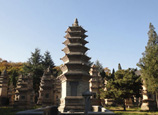
BEIJING, March 4 (Xinhua) -- Located south of Jinling Township in east China's Shandong Province, the Qilu Chemical Industry Park is home to a number of major chemical plants.
Although the plants have brought significant tax revenues for government authorities, they have also sowed pollution worries among local residents.
"There are irritating smells in the air," said a resident surnamed Ma.
The poor disclosure of vital information remains a source of local complaints, as the local government is struggling to balance efforts to develop the economy and control pollution.
"The government has never made it clear just how much pollution is here or how harmful it is," Ma said.
Pollution has become a particularly thorny issue in China in recent years. Concerns about new industrial projects sparked three public protests in Sichuan, Jiangsu and Zhejiang provinces last year.
China's annual parliamentary sessions began on Sunday. Online polls done by media outlets for the sessions indicate that upgraded counter-pollution efforts and the protection of citizens' environmental rights are among the public's top concerns.
Many people have expressed hope that the parliamentary sessions will bring improvement regarding the government's disclosure of environmental information.
According to official documents effective from May 2008, environmental protection agencies and polluting enterprises should make key environmental information known to the public and thus offer the public a way to contribute to the country's pollution control efforts.
However, the reality is that for many Chinese, obtaining access to that information is not easy.
Beijing lawyer Dong Zhengwei wrote the Ministry of Environmental Protection in January to apply for the results of a national soil pollution survey to be released.
Last month, the ministry turned down Dong's request, saying the survey results were a "state secret."
 |
















 Thousands of policemen hunting car, baby stealer in Changchun | Update: Stolen car found, baby still missing
Thousands of policemen hunting car, baby stealer in Changchun | Update: Stolen car found, baby still missing


![]()
